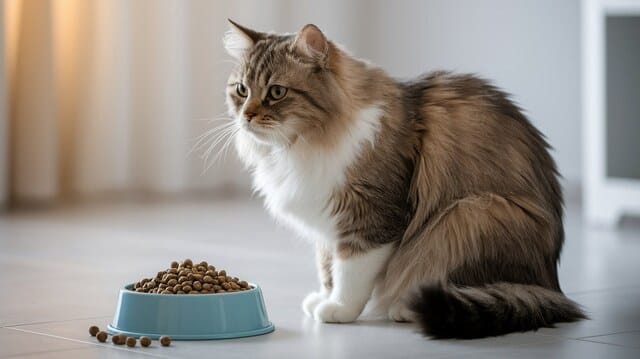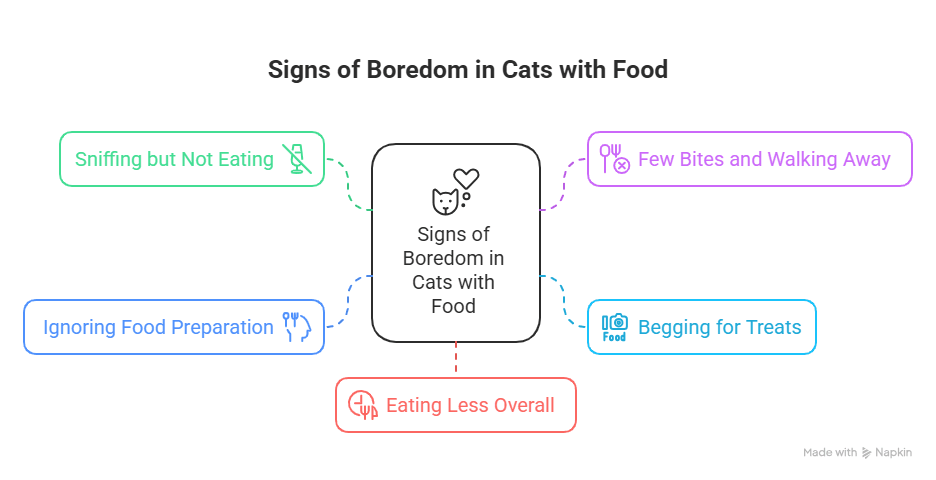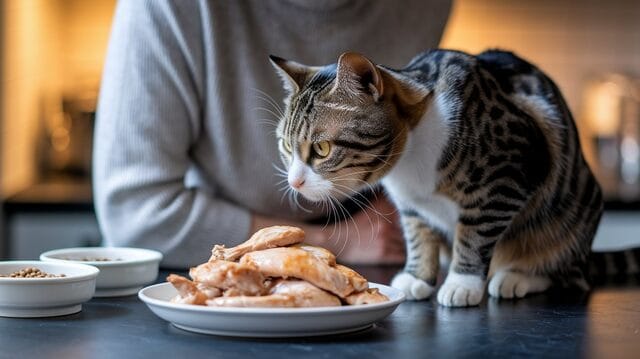
Introduction
Does this sound familiar? You’ve been feeding your cat the same food for months. They loved it—until one day, they didn’t. Now they’re sniffing it, taking a nibble, and walking away like it’s yesterday’s leftovers.
If you’ve found yourself asking, “Can cats get bored of the same food?”, you’re definitely not alone. While cats aren’t foodies in the same way humans are, they can become picky or lose interest in their meals for several reasons. Let’s break down whether food boredom is real, how to recognize it, and what you can do to keep your cat happily eating.
Do Cats Really Get “Bored” of Food?
Technically, cats don’t experience boredom with food in the emotional way we do. They don’t crave variety for novelty’s sake. But that doesn’t mean they won’t become disinterested in food if it no longer appeals to their senses, especially smell and texture.
So while cats might not need a rotating menu, they can develop a kind of behavioral boredom or “food fatigue,” particularly if the food isn’t fresh, has changed in formulation, or if they’ve been spoiled with tastier treats.
How a Cat’s Sense of Taste and Smell Works
Here’s something surprising: cats have far fewer taste buds than humans—about 470 compared to our 9,000. That means they don’t detect flavor the way we do.
But what cats do have is a supercharged sense of smell. They rely heavily on scent to decide whether something is edible or appetizing. If your cat doesn’t like the smell of their food—even if the flavor hasn’t changed—they may walk away.
That’s why room-temperature wet food often goes over better than cold, and why warming food slightly can reignite their interest.
Signs Your Cat Might Be Bored With Their Food

It’s not always easy to tell if your cat is bored or just being a diva. But here are some common signs that suggest they’re losing interest in their meals:
– Sniffing the food but not eating it
– Taking a few bites, then walking away
– Begging for treats or human food but ignoring their bowl
– Watching you prepare the food, then ignoring it completely
– Eating less overall, with no signs of illness
Remember—any significant or sudden changes in eating behavior should always be monitored closely.
Other Reasons Your Cat Might Stop Eating
Before you blame boredom, it’s important to rule out other causes. Cats may avoid their usual food due to:
– Dental issues like tooth pain or gum disease
– Digestive upset or nausea
– Stress from a change in environment or schedule
– Stale or spoiled food (yes, even dry food can go bad!)
– Underlying illness—especially in senior cats
If your cat hasn’t eaten at all in over 24–48 hours, or shows signs of lethargy or vomiting, it’s time to call your vet.
Should You Change Your Cat’s Food Regularly?
You don’t have to switch up your cat’s food every week—but occasional variety can help prevent boredom and even improve digestive health, especially when done right.
✅ When variety helps:
– Picky eaters
– Cats that easily tire of the same flavors
– Seasonal transitions or life stage changes
⚠️ When to avoid sudden changes:
– Cats with sensitive stomachs
– Those on prescription or veterinary diets
– Senior cats with fixed routines
If you do want to rotate foods, always transition gradually to avoid upsetting their digestive system.
How to Safely Introduce New Foods or Flavors
Here’s how to switch up your cat’s diet the right way:
1. Start small: Mix 25% new food with 75% old food for 2–3 days.
2. Increase slowly: Move to 50/50, then 75/25, then 100% new over a week.
3. Watch their reaction: Check for vomiting, diarrhea, or refusal.
4. Keep the format similar: Don’t switch from dry to wet or pâté to chunks all at once.
You can also introduce new flavors within the same brand to minimize resistance.
Tips to Keep Your Cat Interested in Their Food
Here are a few simple tricks that can reignite your cat’s interest:
– Warm it up: Microwave wet food for 5–10 seconds to enhance aroma.
– Switch textures: Alternate between pâté, shredded, minced, and chunks.
– Add a topper: A spoonful of tuna water, broth (no onion or garlic), or a vet-approved topper can add appeal.
– Feed on a schedule: Free-feeding can lead to boredom. Set mealtimes help build anticipation.
– Try puzzle feeders: Great for mental stimulation + portion control.
When to Talk to a Vet
Always contact your vet if your cat:
– Hasn’t eaten in more than 24 hours
– Shows signs of weight loss or dehydration
– Suddenly refuses a previously loved food
– Has digestive symptoms (vomiting, diarrhea, bloating)
– Seems lethargic or withdrawn
It’s always better to be cautious—especially since cats can develop serious complications from not eating, including liver issues like hepatic lipidosis.
FAQs
Do cats prefer variety in their diet?
Some do! While many cats are creatures of habit, others enjoy different flavors and textures. Introducing variety slowly can prevent boredom.
Is it bad to feed my cat the same food every day?
Not necessarily, as long as it’s complete, balanced, and your cat eats it willingly. But some cats benefit from rotating between a few trusted options.
Can I give my cat treats if they’re bored with meals?
Use treats sparingly. If your cat is holding out for treats and avoiding meals, it’s time to reassess your feeding routine.
Also Read - Why Do Cats Wag Their Tails While Lying Down? The Real Meaning Behind the Movement
Conclusion
So, can cats get bored of the same food? In a word—yes, but not in the way we do. Cats can become disinterested if their meals no longer appeal to their senses, especially smell and texture. While true boredom may not be the only reason your cat stops eating, it’s certainly a factor worth considering.
Keep things interesting by rotating flavors, changing textures, and offering occasional variety, all while keeping a close eye on your cat’s health and habits. With a little patience, you can keep mealtime both nutritious and enjoyable for your feline friend.




